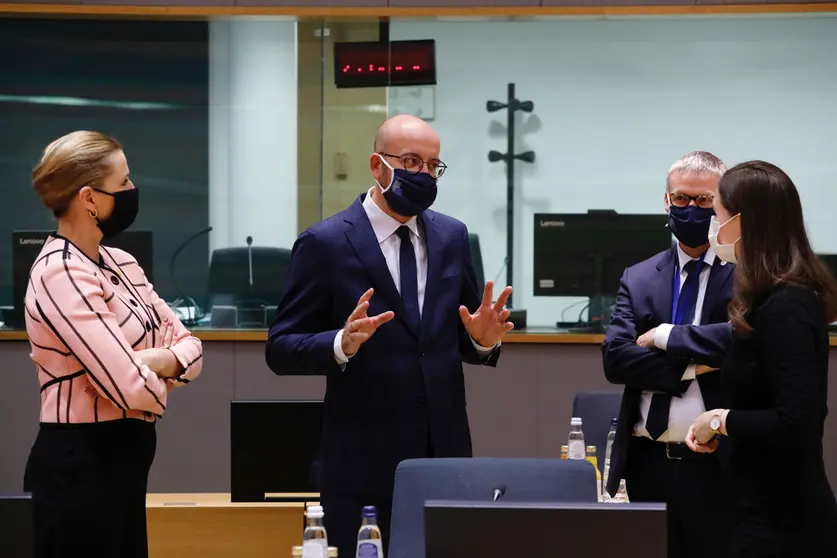After months of negotiations, the European Union was able to show a united front on Friday in imposing sanctions against several Belarusian authorities, with the US later following suit.
Cyprus had until late on Thursday vetoed passing the sanctions unless more restrictive measures against Turkey in response to the latter's gas explorations in the eastern Mediterranean sea were also agreed.
After group and bilateral talks aimed at winning over the Mediterranean country, Nicosia dropped its blockade in exchange for the EU warning Turkey that sanctions might follow if it broke international law again.
The two issues are not directly related, but Cyprus had argued the EU must act consistently when responding to the violation of core principles.
Once that blockade was lifted, sanctions against 40 Belarusian officials - which do not include President Alexander Lukashenko - were swiftly adopted on Friday afternoon.
The officials, accused of being involved in the disputed August elections and of rights abuses, face entry and property bans.
The US Treasury Department also issued sanctions against eight people, including the interior minister and his deputy for directing "a law enforcement system that has abused the human rights of Belarusians on streets and in prison cells across the country."
Minsk's response
The Foreign Ministry in Minsk responded sharply to the EU sanctions, issuing its own list of names of people who can no longer enter from the EU, and reducing its staff at its embassies and consulates.
The ministry also took special aim at Poland and Lithuania, which must remove dozens of staff from the embassies in Minsk and are also being advised to recall their ambassadors - a suggestion Lithuania strongly rejected.
"We definitely do not intend to call (the ambassador) back for consultations and we will certainly not decide to reduce the number of employees," Lithuanian Foreign Minister Linas Linkevicius said.
Minsk meanwhile has cancelled accreditations of foreign journalists with immediate effect, as the ministry had previously threatened, making coverage of the ongoing protests in the country especially difficult.
A women's march is planned for Saturday in the centre of Minsk against police violence and mass arrests, according to organizers.
Merkel celebrates 'success'
During a press conference following the second day of the meeting, German Chancellor Angela Merkel made a point of lauding the EU leaders' breakthrough on sanctioning Belarusian officials.
It had been "a success," she said, that the EU had come to an agreement over Turkey after an "intense" summit.
"It was important, but also overdue," she said.
Similarly, Greece's Prime Minister Kyriakos Mitsotakis called the agreement a "clear message of unity, solidarity and determination."
"Greece is absolutely satisfied with the conclusions of the summit," he said on Friday.
The countries agreed to reassess the situation at the end of the year.
Yesterday's breakthrough averted a brewing diplomatic crisis.
While EU law permits the council to pass restrictive measures by qualified majority voting, the European Union wanted to show a united front to the world, and multiple leaders expressed their unwillingness to force an adoption without Cyprus' approval.
Perhaps in another show of unity and integration, the European Commission announced on Friday that it would pay 720 million euros (843 million dollars) for the construction of a new electricity cable connecting the Baltic states to the European network.
China, Nagorno-Karabakh
Other topics discussed on the summit's second day were almost a sidenote: the EU's relations with China, the bloc's digital strategy, how to boost the internal market and foreign affairs hotspots.
With these other issues, the premiers also tried to send the message of a strong, united EU - in the absence of concrete measures.
Speaking about the escalating conflict in Nagorno-Karabakh, Bulgarian Prime Minister Boyko Borisov stressed the EU's unity.
Azerbaijan and Armenia have been engaged in intense fighting in recent days over Nagorno-Karabakh, held by Christian Armenian forces for decades but internationally considered part of predominantly Muslim Azerbaijan.
The European Commission on Friday announced it would send 500,000 euros to EU humanitarian partners, such as the Red Cross, in the region. "Everyone was sharing one and the same opinion," Borisov said on Friday. "We are calling for ceasefire as soon as possible."









